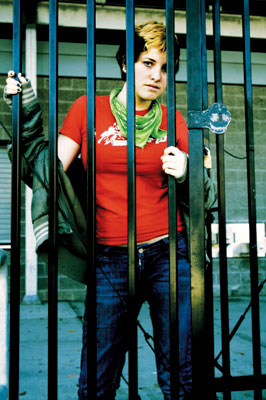All Nonfiction
- Bullying
- Books
- Academic
- Author Interviews
- Celebrity interviews
- College Articles
- College Essays
- Educator of the Year
- Heroes
- Interviews
- Memoir
- Personal Experience
- Sports
- Travel & Culture
All Opinions
- Bullying
- Current Events / Politics
- Discrimination
- Drugs / Alcohol / Smoking
- Entertainment / Celebrities
- Environment
- Love / Relationships
- Movies / Music / TV
- Pop Culture / Trends
- School / College
- Social Issues / Civics
- Spirituality / Religion
- Sports / Hobbies
All Hot Topics
- Bullying
- Community Service
- Environment
- Health
- Letters to the Editor
- Pride & Prejudice
- What Matters
- Back
Summer Guide
- Program Links
- Program Reviews
- Back
College Guide
- College Links
- College Reviews
- College Essays
- College Articles
- Back
The Business of Imprisonment
Privately owned prisons have existed since 1984 when the Corrections Corporation of America began operating a Juvenile Detention Center in Tennessee. Since then, the pockets of Damon Hininger, George Zoley, and other executives in the prison business have been lined at the expense of our nation's most troubled and vulnerable. In recent years, many news sources and reporters have attempted to expose the public to the injustice of Private Prisons. Shane Bauer is one of these reporters.
Shane Bauer, an investigative journalist, went undercover as a corrections officer in Winn, Louisiana to expose the true nature of the Corrections Corporation of America. While undercovered, Bauer uncovered extreme conditions that include violence, lack of training, poor medical and mental health care, mismanagement, and lack of training. An employee responsible for the training of new corrections officers relayed that “if you come here and you breathing and you got a valid driver’s license and you willing to work, then we’re willing to hire you” when asked about hiring practices. Another stated that “sometimes, you just can’t do things the right away” when questioned about following the rules. All throughout the four and a half month stint undercover, Bauer heard guards bragging about abusing inmates, failing to fulfil responsibilities, and stealing from inmate’s personal belongings. Shane Bauer’s exposé reveals the true atrocities of life inside privatized prisons across the country and implores the reader to question whether or not they are willing to support these egregious violations of conduct.
In most cases, those in favor of privatized prisons present two major arguments. The first of these being, in fact, an argument against a point that the opposition often presents. The second of these is based only loosely on fact and excludes a major part of the narrative. These two points are generally presented in the following way:
Profit from incarceration is inevitable-be it from private prison corporations or public prison contracts with outside suppliers.
Private Prisons are cost effective and that these savings somehow negate the many inadequacies of these institutions.
The first argument attempts to maintain that profiting from imprisonment is not only ok, but unavoidable. Proponents of private prison corporations claim that making money due to incarceration happens in every prison both public and private. They argue that a contract that a public prison may make with an outside supplier constitutes as profiting from incarceration in the same way that a privately operated prison makes money based on how many people they have in their facility. This point fails to recognize the difference between paying for a service necessary for keeping imprisoned persons healthy and making money simply based on how many imprisoned people they house. In the first situation, there is no incentive to possibly imprison more people because the profit does not go to the public institution, it goes to the contractor. In the second there is every incentive to lock up more people, the more beds they fill the more money they make. This direct relationship between money for private prison groups and number of people incarcerated is displayed effectively through the people to money ratio. In 2016 the GEO group, one of the nation’s largest private prison corporations, had a net revenue of $2.18 billion and housed 18% of federal prisoners. This statistic calls americans to question whether or not it is acceptable to make billions of dollars off of incarcerated people.
The second argument is based only loosely on fact and is entirely deceptive in its presentation. Even if a private prison corporation did in fact save taxpayers money, how are we to justify placing money over human lives? Multiple reports have shown that violence is much higher in privately owned prisons due to the facility being understaffed in an attempt to save money on salaries or because of poorly trained guards. In fact, violent interactions between inmates are 28x more likely in private facilities.Moreover, mistreatment of prisoners is far more prevalent in private facilities. According to a report issued by the U.S Department of Justice, inmates in private facilities were “nine times more likely to be placed on lockdown” and were “frequently subjected to arbitrary solitary confinement”. Further, any savings that they may boast is accredible entirely to the fact that privately owned prisons attempt to save on inmate health care by selecting only the young and healthy to house. Even with this game of selection, the savings are so small that they are negligible.
The two arguments presented by the pro private facilities group force us to call into question the true moral fiber of the United States. Is it ok to make money off of revoking the freedom of an American citizen? As a country, are we willing to promote further, possibly unnecessary, incarceration? Do we as a nation value money or humans over the other? Finally, most importantly, are we willing to watch the CEOs of private prison corporations get rich off of our nation's most vulnerable population?

Similar Articles
JOIN THE DISCUSSION
This article has 0 comments.
